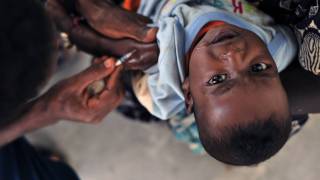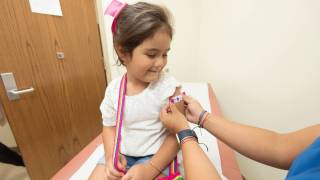Mumps Virus May Require 3rd Vaccination For Continued Protection

Many vaccine researchers are trying to understand why mumps cases are appearing around the USA and worldwide.
A new study from the Harvard T.H. Chan School of Public Health school found that vaccine-derived immune protection against mumps persists an average of about 27 years after the last dose.
These researchers estimated that 25 percent of people in the U.S. vaccinated against mumps may lose protection within 7.9 years, 50 percent within 19 years, and 75 percent within 38 years.
Which means, in addition to the currently recommended 2 doses of mumps vaccine early in life, a 3rd booster shot may help sustain immunization among adults.
“Knowing that protection wanes in the long term can help inform how we deploy vaccines to prevent or contain future outbreaks,” said Joseph Leonard, a postdoctoral research fellow at Harvard Chan School.
This Harvard study supports the January 2018 Centers for Disease Control and Prevention (CDC) committee’s recommendation for 2 doses of MMR vaccine appears to be sufficient for mumps control in the general population, during normal situations.
But, new research indicates 2 shots of the vaccine are not sufficient for preventing mumps outbreaks in prolonged, close-contact settings.
Even where most people already have 2 doses of the MMR vaccine, says the CDC.
These studies report the second MMR vaccine-induced immunity diminishes with time.
Considering the evidence, persons who are at increased risk for acquiring mumps were identified as a public health priority, and should receive a third dose of mumps virus–containing vaccine, said the CDC committee.
Recent mumps outbreaks, including on college campuses, began occurring among vaccinated young adults around 2006 and have continued during 2018.
From January 1 to February 24, 2018, 32 states and the District of Columbia have reported mumps infections in 304 people to CDC.
Recent 2018 mumps outbreaks include:
The resurgence is troubling, the Harvard authors wrote, because mumps infections may cause complications such as testicular inflammation (which may result in infertility), meningitis, and deafness.
Mumps is a contagious disease caused by a virus that spreads through saliva and other fluids from the mouth, nose, or throat.
An infected person can spread the virus by coughing, sneezing, or talking, and sharing items, such as cups or eating utensils, with others, and touching objects or surfaces with unwashed hands that are then touched by others.
The Harvard researchers found no evidence that new strains of the mumps virus are contributing to changes in vaccine effectiveness.
Moreover, their model suggested that new strains would not be expected to cause cases in the age groups affected by recent outbreaks.
Funding for the study came from National Institute of General Medical Sciences award U54GM088558 and a Doris Duke Charitable Foundation Clinical Scientist Development award. For more information: Todd Datz: [email protected]
MMR-II and ProQuad vaccines both contain the protection for mumps, as well as protection against measles and rubella. ProQuad additionally protects against varicella.
Most pharmacies offer MMR vaccination services.
The CDC Vaccine Price List provides private sector vaccine prices for general information.
Vaccine discounts can be found here.
Our Trust Standards: Medical Advisory Committee


























